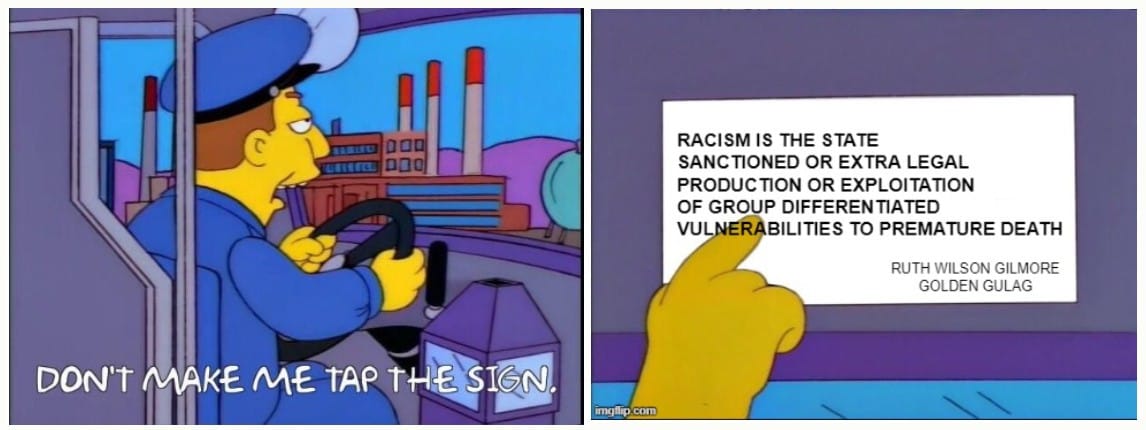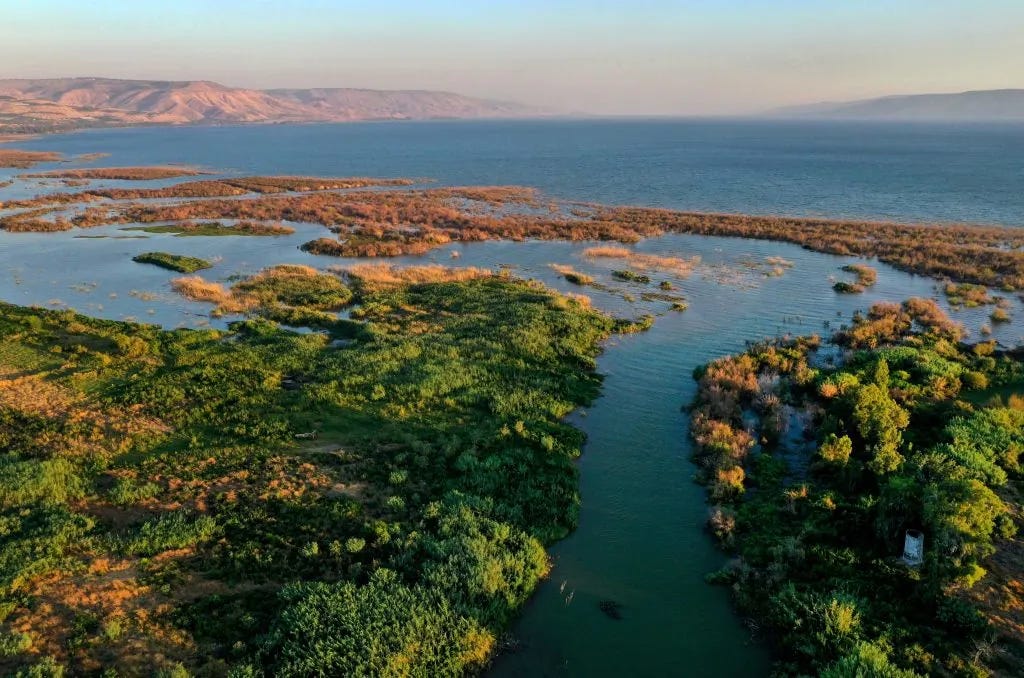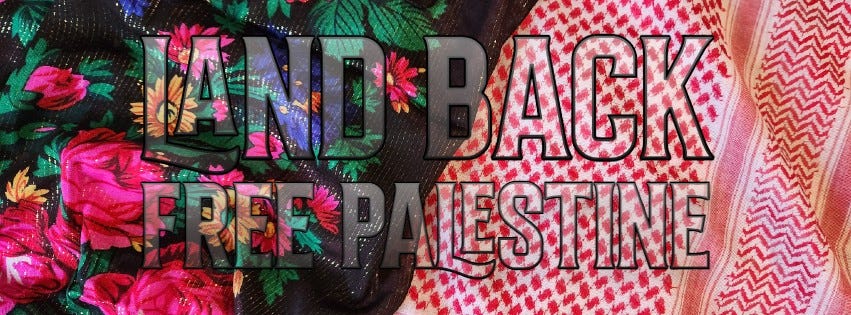From the rivers to the seas
Indigenous people do not die quietly

No books today. Maybe many books, let’s see what happens because I’m thinking about so many things and books will obviously be part of that. The news out of Palestine has been relentless, and collides with my own anti-colonial work here. We have to use whatever platform we have to talk about Palestine, so I will, but before I go further I will remind you of Ruth Wilson Gilmore’s definition of racism.
“Racism, specifically, is the state-sanctioned or extralegal production and exploitation of group-differentiated vulnerability to premature death.”
― Ruth Wilson Gilmore, Golden Gulag: Prisons, Surplus, Crisis, and Opposition in Globalizing California
Because what I want you to think about as you read further is the power imbalance. Who has access to the machinery of the state and who gets crushed beneath that machinery. While it is true that interpersonal relationships can be free of this kind of violence, one person in that relationship still has access to power that the other doesn’t and they can mobilize that power in all sorts of ways. Here in Canada or the US a white woman working as a nurse may like Indigenous people very much (what does that even mean, to “like” an entire race?) but when a young Indigenous woman with a documented history of mental illness or substance use comes to the ER complaining of pain, that ER nurse will still follow protocol and send her home rather than “reward” what the policy describes as drug or attention seeking behaviour. That’s the neat thing about policies and protocols that disproportionately impact Black and Indigenous people, you don’t even have to think a racist thought to mobilize them in ways that lead to premature death. The book White Benevolence contains multiple essays about the ways that racism is baked into helping professions. Systems are the problem, but they are made of people. White Tears/Brown Scars also describes how individual women can access that power in ways that have deep consquences for Black and Brown women.
I’ve digressed. We’re talking about Palestine. It’s just that I see so many parallels between what’s happening there and here. I don’t really care that individual Israelis and Palestinians can be friends. I’m watching a state crush one group of people to benefit another.
We refuse the question because we refuse the premise of the question.
Harsha Walia opened her October 9 remarks at a solidarity gathering in Vancouver with these words. We who resist colonization are asked to condemn the violence of Hamas, of the George Floyd protests, of Indigenous blockades. But that question requires us to ignore the violence of occupation. Harsha went on to say that the question never includes the daily brutality and daily violence of the illegal and colonial occupation. As always, the violence of the resistance is framed as unprovoked while the ongoing and daily violence of the occupier is either ignored completely or framed as justified retaliation.
This is not a religious war. This is not Jews against Muslims or Israelis against Palestinians. This is a settler-colonial state occupying lands that were not empty, and occupation is violent. When colonial powers landed in what became the Americas, the Doctrine of Discovery assured them that because the people in those lands were not already Christian, the land was effectively empty. Similarly, the land of Palestine was described as "A land without a people for a people without a land" - a phrase coined by Christians in the mid 1800s by the way, not Jewish people although Zionists would later mobilize it. Neither of these statements meant that there weren’t any people there, just that they didn’t matter. They meant that the land was available for settlement by those who would use it correctly, or had a right to it that superceded the rights of those already there. It takes violence to occupy lands that have people living in them, and it takes violence to maintain that occupation.
From the river to the sea, Palestine will be free.

The land of Palestine is bordered by the Jordan River on the east and the Mediterranean Sea on the west. It runs north to south between these bodies of water and has existed for millenia. People told me that the land once belonged to Israel and was promised to them by God and that is why they should have it now. Just as in what are now the Americas, there are many peoples who are Indigenous to that land, whose creation story places them there in that space between the river and the sea. A friend reminded me last week that before the state of Israel existed there was Palestine, under the Ottoman Empire, and that within Palestine there were Jews, Muslims, and Christians all of whom thought of themselves as Palestinian and all of whom lived together in layered relationship which sounds much like what Aaron Mills describes on page 86 in his dissertation on Anishinaabe governance. Not always getting along, but without the violence we see now. Militarized ethnostates do not keep anyone safe no matter how many walls you build. Not here. Not there. They don’t keep us safe, and they don’t make us free.
But even if it was a kind of return, this militarized ethnostate filled with prisons encircled by barbed wire and protected by missiles is not my vision of #LandBack. We didn’t live that way, neither did Palestinians. During the early decades of colonization the French and British did arm Indigenous allies and they exacerbated old conflicts, conflicts that we had resolved through treaties like the One Dish or various confederacies, because it served them to do so. It served them to have us fighting each other on their behalf. So it’s more like if the British armed only one tribe, gave that one tribe authority over the entire area, and then stood by while members of that tribe slaughtered everyone else. Which, to some extent in pockets and places across this continent is exactly what did happen. The difference being that in the end none of us wound up with the land because they never meant for us to have it. It all went to the colonial powers.
It’s still easier to ship weapons across oceans than it is to ship soldiers, and more profitable too. The US sends billions in aid to to Israel, and much of that money winds up back in the coffers of US owned arms dealers. They did this in Central America too, selling just enough weapons to keep the conflict going. So that’s what Europe did with the state of Israel, arming and legitimizing one group of people and manipulating the legitimate fears that Jews had after the horrors of the Holocaust. As if Europe does not have a history of anti-Jewish violence going back millenia. Rather than solve the problem of why Jews (and Muslims) haven’t ever been safe in Europe, they did what colonial states do: they offloaded their violence to somebody else.
In her brilliant and necessary book, Border & Rule, Harsha Walia unpacks all of this in the context of states and borders. She talks about Fortress Europe and Zionism, about migrant labour and how movement is controlled. The ways that this violence is projected onto the victims of violence, as if they are the problem. And the victims are the problem because they won’t die quietly, they won’t stay confined, they push back. It’s like when one of my kids was being bullied at school and he was the one who got in trouble for defending himself. He was the one who was supposed to stay inside, or near the teacher, or some other strategy that promised him safety while effectively excluding him. We eventually solved it ourselves, not through violence but by organizing the kids themselves. They all agreed not to play with the bully unless he stopped. And it worked. That’s what BDS is. An organized refusal to play with the bully until he learns to act right. They want us peaceful like MLK but he got assasinated. Standing Rock was peaceful, they got water cannons in sub zero weather and attack dogs. They say they want our protests and resistance to be peaceful, but our peaceful strategies are criminalized anyway.
When I was 9 we started going to church. Church taught me that Israel was always meant to be, that this was the true center of the world around which all history revolved and where the final act would play out before the new world came into being. It’s a distorted kind of love and support, they must all gather in this place and then be destroyed before a new world could exist, because that’s how this interpretation of an apocalyptic text plays out. Jews return to Israel and then there is Armageddon and they all die, or at least the ones who don’t accept Jesus as the promised Messiah. Kind of like what I said happened in the Americas, in the end the Jews won’t get the land anyway, it will wind up with Christians.
How is that not genocide? It’s Noah Redux, except that the ark is a little bigger. The sect of Christianity that holds these particular beliefs is alarming to me now, looking at something I once believed from the outside. Looking at it from the perspective of one whose body carries the memories and echoes of other genocides.
I am Ojibwe Anishinaabe through my father and German/Ukranian through my mother, so finding belonging in this place is not simple. My roots reach deeply into this land, my father’s people have been here for so long that their word for north, giiwedin, contains memory of glaciers receding. When I learned that it boggled my mind, this word contains memory not only of these massive sheets of ice receding but it knew that they had not always been there. We forget that sometimes, often maybe. We think that the world that we know is the only one that has ever existed, but land based people have different memories. Many of our stories talk about worlds ending and new ones beginning. The fact that we still know these stories about giiwedin tells me that our memories continue to reach back and that those paths to the distant past are well trodden. We don’t live in a constant now.
But my roots also seek out distant lands, places across an ocean and a continent, that isn’t really a continent. We talk about the continent of Europe, which is a political fiction. Geographically it’s a small peninsula extending off of Asia, but Europe thinks it’s the center of the world so it imagines itself to be much bigger and important than it really is. Through my maternal family, with whom I was raised, I am connected to lands in Germany and Ukraine, growing up on stories of the Holodomor. Another genocide I carry in my bones. I don’t know if they would remember me. In one sense that’s a ridiculous statement. I never lived there. The lands and waters north of Lake Superior remembered me, the beings I lived on and with for my first couple of years. I’ve never set foot in Germany or Ukraine. But these lands are connected by water, by things carried on the wind. Is it unreasonable to think that the waters from the far north which flow through the Great Lakes and along the Niagara River where I live, into the Atlantic Ocean would carry stories of me to these lands? That these stories wash up on distant shores, leaving memories in the sand which gets carried inland until something notices a familiarity? Does something that knew my mother or grandparents become alerted to the stories of a distant relative?
Is that fluidity why borders must be maintained with such violence? Because their reality is intangible and violence is the only way to make them tangible?

In her poem, The First Water is the Body, Natalie Diaz writes
Text within this block will maintain its original spacing when publishedThe Colorado River is the most endangered river in the United States—also, it is a part of my body.Text within this block will maintain its original spacing when publishedI carry a river. It is who I am: ‘Aha Makav. This is not metaphor.Text within this block will maintain its original spacing when publishedWhen a Mojave says, Inyech ‘Aha Makavch ithuum, we are saying our name. We are telling a story of our existence. The river runs through the middle of my body.
From the river, to the sea Palestine will be free.
A river runs through Palestine, through Palestinians. A river runs through me, through Natalie Diaz. Rivers run through us all, carrying fragments and stories of us out to the sea. We carry the river inside of us all, rivers that cannot, no matter how much violence is wreaked upon our bodies, be contained and controlled. We will be free.
“people getting free, anywhere, deserve our solidarity and live in our imaginations as horizons for liberation.”
- Harsha Walia
And that is why they hate us, why they fear us and criminalize us. Not because they fear that we will do to them what they do to us every single day, we do not have their capacity for violence. We don’t have their weapons or access to their allies or the levels of funding that they have. Resistance may sometimes bring the violence to the oppressor, it may do those things that it experiences by shutting off however temporarily access to water and electricity, food, and movement. It is a fleeting action, meant to be disruptive, but it is in no way equivalent. Because resistance groups simply don't have the power or resources to sustain those actions the way that occupying powers do. And the fear it engenders fades as the state retaliates, demonstrating its might in disproportionate violence.
Indigenous peoples do not die quietly, and even the smallest of victories bring hope to us all.

Please consider donating to support the people of Gaza. Some limited aid is being permitted to enter but it is a drop in the bucket compared to what is needed.
Doctors without Borders/Medicin Sans Frontiers
American Friends Service Committee
There are a number of petitions you can sign which vary in their asks, most are demanding a ceasefire which really is the floor. It is the barest of minimums and will not solve the problem of occupation but it will buy time for Palestinians to grieve and work towards a more just society.
